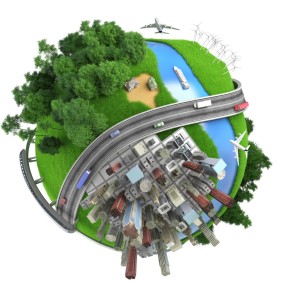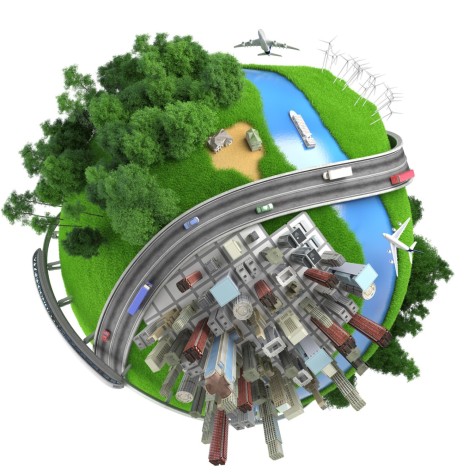-
![]() Picture: Pablo Castagnola
Picture: Pablo Castagnola![]() Picture: Pablo Castagnola
Picture: Pablo CastagnolaThe containerization of single wagonload transport in the magazine “Internationales Verkehrswesen”
2024/04/09
In order to support the modal shift from road to rail freight transport, it is necessary to increase the attractiveness and competitiveness of single wagonload transport. Innovative concepts that enable the separation of freight wagons and containers in single wagonload transport offer new potential for acting more flexibly and responding better to customer needs.
-
![]() Picture: log
Picture: log![]() Picture: log
Picture: logAnnouncement: “Intermodal Transport Services” now with oral exam!
2024/04/01
Please note that, starting with the summer semester 2024, the course “Intermodal Transport Services” will have an oral exam!
-
![]() Picture: ICPLT
Picture: ICPLT![]() Picture: ICPLT
Picture: ICPLTSave the Date: 7th ICPLT conference, 18-19 March 2025 in @TU Darmstadt
2024/03/19
Save the date! We are excited to announce the 7th Interdisciplinary Conference on Production, Logistics, and Traffic (ICPLT ‘25), happening on March 18-19, 2025, at the City Center Campus of TU Darmstadt.
2024
In order to support the modal shift from road to rail freight transport, it is necessary to increase the attractiveness and competitiveness of single wagonload transport. Innovative concepts that enable the separation of freight wagons and containers in single wagonload transport offer new potential for acting more flexibly and responding better to customer needs. In our article in the latest issue of “Internationales Verkehrswesen”, Aylin Altun and Prof. Elbert discuss the changes to be expected in planning and processes as a result of the containerization of single wagonload transport.
The topic of containerization is particularly interesting when it comes to the scheduling of carrying wagons and containers. We are conducting research on this topic in cooperation with DB Cargo as part of the Research Lab Innovative Freight Wagon .

On 15 Februar 2024, our dedicated students from the course “Airport Management” embarked on an insightful journey at Frankfurt (Main) Airport. Accompanied by visiting lecturer Michaela Schultheiß-Münch and our research associates Ren Kajiyama and Felix Roeper, the students explored the intricacies of airport operations. From the dynamic environment of the three terminals to witnessing the choreography of take-offs and landings, every moment was a lesson in the multifaceted world of aviation. The cargo section, particularly significant for our students, provided a first-hand look at aircraft maintenance and loading procedures. Among the highlights was a surprise visit from a Canadian military aircraft, making a pit stop for refueling. A day filled with invaluable experiences, broadening perspectives on airport management.

Life is a constant exchange – as it is for the students on our “International Logistics Systems” course, who had the opportunity to get to know the House of Logistics and Mobility in Frankfurt am Main on February 7, 2024. Accompanied by Prof. Elbert, the future logistics experts first visited our interactive showroom, the “Innovation Lab on Combined Transport”, and learned more about application-oriented research and the complexity of the transport chain in combined transport.
The students were then welcomed by Christian Hintze, Head of DB CargoLab, who, together with Tim Tenhaef, Claudia Scheibel and Thorsten Kühnapfel, introduced them to the digital and automated solutions that are being developed there. New technologies and IT applications are brought to market maturity in a cross-process and customer-oriented way to make environmentally friendly rail freight transport more competitive. Practical examples, such as automated damage detection and condition-based maintenance strategies for locomotives and freight wagons or customer portals based on location and sensor information, showed the students at first-hand how study content is applied in practice.
An exciting day full of insights into the future of logistics – thank you very much for the fascinating exchange. We look forward to future visits!

Precise knowledge of utilization data is crucial for the efficient management and improvement of rail transport in Germany. The German Centre for Rail Transport Research (DZSF) of the Federal Railway Authority (EBA) has initiated the “MONI” research project to collect utilization data on rail freight transport, local rail passenger transport and long-distance rail passenger transport using an interdisciplinary approach.
As part of this research project, existing approaches from passenger rail transport for collecting capacity utilization data are to be reviewed and further developed for freight transport using modern methods. Technological advances in big data and AI will be used to open up new opportunities for data collection and analysis in rail transport.
We are looking forward to contributing to the research: Our focus is on the identification and analysis of capacity utilization indicators in rail freight transport and the techniques used to measure them. Interview studies will be used to identify key utilization figures and requirements for a monitoring system.
Stakeholders from the rail freight transport sector such as operators, terminal operators, freight forwarders, rail transport companies and freight transport companies will be interviewed. Our overarching goal is to develop a solid knowledge base for future innovative, data-based solutions in rail transport capacity management.
The project is being carried out by IndustrieanlagenBetriebsgesellschaft (IABG) mbH as the DZSF project representative in cooperation with Interautomation Deutschland GmbH, RS Consult Holding UG and the Technical University of Darmstadt.
Here you can find out more about how we are helping to shape the future of freight transport.

What trends could determine the future of mobility and aviation? On Monday, January 22, 2024, we were excited to welcome Sascha Barthel on campus for a guest lecture on Innovation in Aviation and Future. As Head of Innovation at the House of Logistics and Mobility (HOLM) GmbH, he gave valuable insight to our students complementing our lecture “Airport Management.”
The guest lecture offered insights into understanding what shapes “the” future in any given area, how foresight management can help interpret developments, and how trends emerge from them and how these trends can be identified and harnessed – especially to determine the future of mobility and aviation.
A big thank you from our team for this fascinating presentation! We are looking forward to the next time!

2023
Road freight transport companies navigate a landscape of challenges, marked by intense competition and constantly increasing CO2 prices. In this dynamic environment, the imperative is clear: embrace technologies that are both cost-effective and environmentally friendly. So how can we actively contribute to enhancing the cost-effectiveness and CO2-friendliness of road freight transport?
Driven by this question, in the research project "Decentralized planning of platoons " we investigated what contribution platooning can make as a technology, if the decision to form a platoon is the responsibility of an AI.
Utilizing an agent-based and discrete-event simulation model, we explored cost savings for transport companies through decentralized platoon formation. The decision-making process, facilitated by a sophisticated large language model (LLM), opens up new possibilities for efficient coordination.
The results speak for themselves: transport companies with a fleet of 20 trucks can save up to €515/day with platooning technology, even with a low market penetration and without asking the LLM. With asking LLM transport companies can save up to €430/day. Savings vary based on factors like distance traveled and the likelihood of encountering other platooning-capable trucks on the route.
A big thank you to our dedicated team for realizing this innovative project: The project was realized in collaboration with the Goethe Universität Frankfurt and the Center for Cognition and Computation, led by Prof. Dr. Ramesh, Dr. Michael Rammensee, Dr. De Curtò y DíAz, and Dr. De Zarzà y Cubero, and together with Prof. Ralf Elbert and project lead Felix Roeper. It was funded by the Hessian Ministry for Economy, Energy, Transportation and Housing.
Click here and find out more about the future of road freight transport: https://www.log.tu-darmstadt.de/forschung_log/forschungsprojekte_log/abgeschlossene_forschungsprojekte_log/platooning.en.jsp And make sure to check out the simulation model!

What if dynamic forecasts of the ETA (Estimated Time of Arrival) could also be used reliably in combined road/rail freight transport (CT)? Our analyses show that accurate ETAs offer an enormous advantage.
In November, we celebrated the successful conclusion of our “ETAPEN” research project, which looked at the impact of dynamic ETA forecasts on pre- and post-carriage in CT. It was inspiring to welcome such a diverse group of participants – including our project leaders Prof. Elbert and our Research Associate Johannes Rentschler – from different industries to the final meeting.
The key project results are impressive: especially in situations with severely delayed trains, an accurate ETA forecast can lead to significant cost savings. Based on real data, our simulation showed that a good ETA can enable savings of 1.5% to 3% compared to a poor ETA. SME freight forwarders in particular could benefit from this.
The discussions were extremely stimulating and it was exciting to hear different perspectives from the industry. The mix of expertise and experience provided us with sound insights.
Many thanks to all participants for their valuable contributions and excellent cooperation! We look forward to deepening the results achieved and tackling future projects together.
The research project was funded via the AiF as part of the program for the promotion of joint industrial research (IGF) by the Federal Ministry of Economics and Climate Protection on the basis of a resolution of the German Bundestag. Find out more here
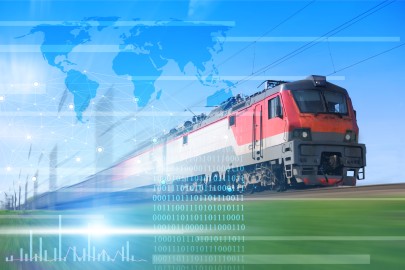
How can intermodal freight transport in Germany contribute to achieving the EU's climate targets? In search of answers, our students traveled to the Mainz-Bischofsheim shunting yard and experienced one of the oldest shunting yards in Germany up close as part of our “Logistics Live!” excursion.
The facility, which was built in 1905, is one of the few remaining manually controlled shunting yards in Germany and remains a hub for single wagon and combined road/rail freight transport to this day.
Together with Prof. Elbert, Paul Bossong and Yuerui Tang, the 24 students gained exciting insights into the traditional side of rail transport, which is still active today. Leo Glaubetz, Head of Support Functions at DB Cargo's Bischofsheim site, guided the group through the eventful history and current operations of the shunting yard.
The visitors were then entered the world of maintenance, where old diesel locomotives receive care and maintenance. These old locomotives, robust and durable, are characterized by their excellent torque, which makes them ideal for shunting, where speed is not a priority. In the workshop, the students had the opportunity to study these robust veterans of the rail industry in more detail.
With practical excursions like this one, we want to show that not only research but also teaching drives the reality of the logistics sector. We are proud to provide our students with such experiences and are already looking forward to the next one!
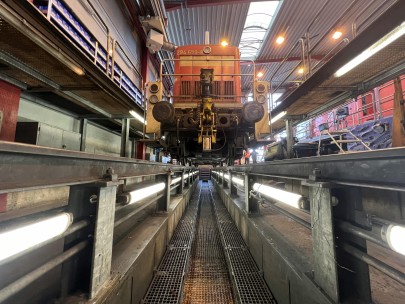
What will the ports of the future have to look like to keep up with the increasing growth in freight traffic? Together with the German-Kazakh University, we are embarking on a new research project to get to the bottom of this question.
Freight traffic in Kazakhstan has grown steadily in recent years, reaching an impressive 4.2 billion tons in 2021. But with growth comes challenges. Disruptions on key transport routes have increased demand on the Trans-Caspian route – that is, transit from Urumchi to the port of Aktau, then by sea to Azerbaijan and on through Georgia and Turkey to Europe. As a result, the port of Aktau is reaching its capacity limits. The aim of this research project, funded by the DAAD and the German Federal Foreign Office, is to expand the port's capacity and increase efficiency in container handling.
Therefore, we are developing a model for automating port processes in order to better understand future requirements and allocate the right resources. In doing so, we are getting to the bottom of various questions: What resources are needed in the port and how can storage and handling capacities be optimized? How does automation affect performance and costs? Which factors have the greatest influence on port performance?

Combined road/rail freight transport (CT) is becoming increasingly important, because only a combination of transport modes can sustainably handle the constantly growing volume of goods. Artificial intelligence (AI) and data-driven planning cannot be missing from this development, of course. Prof. Ralf Elbert and our research associate Yuerui Tang explain in an article in the latest issue of International Transport how AI and loading optimization can support CT and thus the achievement of climate targets.
We already know that CT emits up to 90% less CO2 compared to pure road transport – and by using AI, we can increase the efficiency of this system and thus contribute to a more sustainable future. Because CT combines the best of both worlds: the environmental sustainability of rail and the flexibility of road.
Learn more about how we can change CT sustainably with the research project KIBA.

Let's face it: German freight traffic will grow in the future. That's also what the forecast of the Federal Minister of Transport says. But where to put it? Neither road nor rail can manage the volume of traffic, at least not on their own. Combined Transport (CT) offers a real opportunity.
Looking at a sustainable shift of freight traffic using CT in Hesse and Germany, the 3rd Combined Transport Forum took place on September 15, 2023 at the House of Logistics and Mobility in Frankfurt am Main. Together with representatives of Hessian and German politics, business and science, we looked at the opportunities that Combined Transport – i. e. the transport of goods in one and the same load carrier with two or more modes of transport – offers for German freight transport and the challenges in entails. This is where decision-makers need to start in order to promote CT and take important steps towards sustainable and climate-friendly transport.
Prof. Ralf Elbert spoke about concrete measures to strengthen combined rail freight transport in Germany in a keynote speech on the research project “KV-Radar” , which is being carried out together with Yuerui Tang . With the help of a two-stage survey interviewing experts from the industry, which was conducted for the second time this year, the project identifies measures in the areas of policy, infrastructure, cooperation & coordination, as well as technology & market. The measures are then evaluated on the basis of their feasibility and their impact on market share. While the opinions of our experts sometimes differed widely, most agreed that increasing train path prioritization for rail freight, alleviating staff shortages, and standardizing digital data transmission were particularly important – even if not particularly easy to implement.
Many thanks to all those involved in making the event a success. We are looking forward to the next time!

Prof. Ralf Elbert, Raphael Hackober and Yuerui Tang traveled to Dresden for the 13th Logistics Management Conference from September 13-15, 2023, and presented current research results in not one but two talks. Prof. Elbert and Raphael Hackober spoke about interdisciplinary research of innovations in intermodal rail freight transport and how research addresses these innovations – this is part of ongoing research conducted with Kedge Business School, the Technical University Dublin, the University of Gothenburg and the University of Iceland.
Together with Yuerui Tang , Prof. Elbert spoke about train load planning for intermodal rail operators in a hub-and-spoke network and about optimization possibilities on every level: from individual wagons to entire CT trains, and even the broader rail freight transport network, there's a pressing need for meticulous load planning. They also pointed out that there is untapped potential: while individual wagon and train load planning are well-understood, the real opportunity lies in optimizing the entire service network. Imagine a world where every loading unit is efficiently routed, ensuring maximum capacity utilization and minimal disruptions. To truly revolutionize CT networks, we need to explore mathematical optimization, discrete simulation models, and even machine learning for order prediction. The goal? Boosting sustainability and cost-effectiveness in freight transportation.

Looking at “Sustainability in Production and Logistics”, the ASIM Symposium Simulation in Production and Logistics took place in Ilmenau, Germany this year. At the conference, organized by the Ilmenau University of Technology, Julia Wenzel presented research results on “Evaluation of Different Use Case Configurations in a Robotic Mobile Fulfilment System”, providing insights into the completed research project roboKOM , which explored how logistics mobile picking robots could potentially be used to increase productivity in picking warehouses.

How can spotters increase the efficiency of terminals in combined road/rail freight transport? And how can trucks use platooning in road freight transport to reduce costs for transport companies?
At the 8th HOLM “Innovationsmarktplatz” at the House of Logistics and Mobility (HOLM) in Frankfurt, our research associates presented the results two research projects of the department, which were developed within the framework of HOLM's innovation funding:
Julia Wenzel presented the results on the project SpotIn , and explained how the integration of small, powerful tractors for moving and shunting load carriers, so-called “spotters”, in terminals can lead to increased efficiency in combined road/rail (CT) freight transport.
Felix Roeper presented the results of the project Decentralized Planning of Platoons , conducted jointly with the Center of Cognition and Computation at Goethe University Frankfurt, and showed how individual trucks can form automated platoons with the help of an AI through the use of car-to-car communication in road freight transport to reduce costs for transport companies.

The steel industry in Germany must change: The designated climate targets can only be achieved by converting production to green steel and thus reducing greenhouse gases. To save greenhouse gases, the coal used to date is to be replaced by more climate-friendly hydrogen and the increased use of steel scrap in steel production.
Together with DB Cargo, Aylin Altun and Raphael Hackober , we are starting a new research project which analyzes the extent to which existing logistics concepts need to be optimized due to the increased use of scrap. The project aims to develop a robust logistics concept for the steel industry in the face of uncertain scrap and steel volumes for the rail-based transport of steel scrap to steel producers in Germany.
The research project is part of the “Research Lab Innovative Freight Wagon”, a cooperative institute of TU Darmstadt and DB Cargo for joint research in the field of planning and analysis of logistics and transport services. Visit our research lab here!

Combined road/rail freight transport (CT) can play a critical role in achieving climate targets, as it is one of the fastest growing subsectors of freight transport in Germany. However, rapid growth also places high demands on infrastructure and the efficiency of operational processes.
Together with Hongjun Wu and our associated project partners catkin, Contargo, TFG Transfracht, NP Transport & Logistik and the AI Quality & Testing Hub, we are starting a new research project that aims to identify the requirements and potential for the development of a digital data space in Hesse in order to improve the exchange of information and the efficiency of processes in and around CT terminals. Within the scope of the project “DataKV”, the current data usage around CT terminals as well as the desired state for data exchange via a CT data space from the perspective of the different stakeholder groups involved in CT will be recorded, systematized and evaluated by means of a qualitative interview study. The project is funded by the state of Hesse and HOLM funding as part of the “Innovations in Logistics and Mobility” measure of the Hessian Ministry of Economics, Energy, Transport and Housing.
Learn more here about how we can build an effective data space for CT in Hesse.
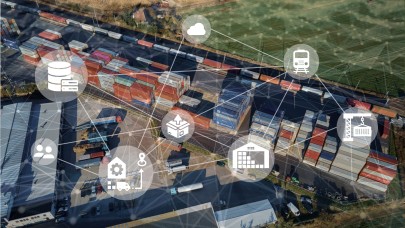
Digitization is constantly pushing the limits of intermodal freight transport and changing how it can operate. From 17 to 21 July 2023, Prof. Elbert , Johannes Rentschler and Felix Roeper gave insights into two of our recent research projects on this topic at the 16th World Conference on Transport Research (WCTR) in Montréal, Canada.
What would happen, if dynamic forecasts of the Estimated Time of Arrival (ETA) could be reliably used in intermodal, especially in combined road/rail freight transport In their presentation, Prof. Elbert and Johannes Rentschler talked about how this could be achieved and what potential it holds, especially for SME forwarders. Find out more about how reliable ETA forecasts can contribute to flexible and sustainable transport chains.
Looking at sustainable freight transport, Prof. Elbert and Felix Roeper talked about how truck platoons in road freight transport can be planned decentralized with the help of AI. They presented the results of a current research project which uses a conceptual approach using deep reinforcement learning to develop an AI to help reduce costs and emissions in road freight transport.
Learn more about the related research project here .
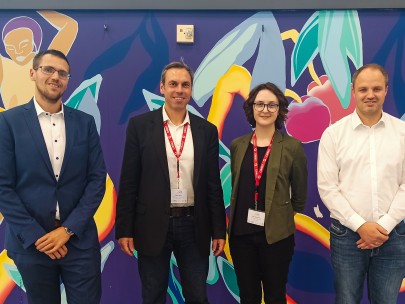
The transport chains of the future need to be flexible and resilient to respond quickly to shortages and disturbances. Johannes Rentschler had the chance to give insights into our current research on exactly this topic together with Prof. Elbert at the International Scientific Symposium on Logistics (ISSL) in Dresden, Germany: The war in Ukraine disrupted global logistics chains and alternative transport routes from Asia to Europe are needed. Together with the German Kazakh University, we are placing a special focus on the Trans-Caspian Route and are exploring the opportunities presented by this new transport route as well as the challenges that must be overcome in order to realize its full potential.
Learn more about the future of the Trans-Caspian Route from our research, or read more about the associated research project .

Combined road/rail freight transport (CT) has the potential to be an environmentally friendly alternative to road freight transport. It combines the advantages of both modes of transport and shifts delivery traffic from road to rail. Unfortunately, CT still poses some challenges today: With many individual players involved in the transport chain, communication and even order processing are not always easy. In the end, availability and timing have to fit perfectly.
A look at current entrepreneurial practice shows that a variety of electronic platforms are emerging to strengthen communication and networking between the individual players in CT. Together with Anne Friedrich and our associated project partners catkin, Rail-flow, Kombiverkehr and Infront Consulting, we are launching a new research project that aims to make CT more attractive. In our project “ConnectedKV”, we are analyzing how such digital, multi-sided transport platforms can be used efficiently in CT, what effects platform use in CT has on established business models, and whether new business models can perhaps even be developed by using the platforms. The project is funded by the state of Hesse and HOLM funding as part of the “Innovations in Logistics and Mobility” measure of the Hessian Ministry of Economics, Energy, Transport and Housing.
Learn more here about how we can facilitate access to combined transport for entrepreneurs.

The future of logistics in Germany: truck-free highways and freight transport by rail – this is exactly what Combined Rail Freight Transport (CT) makes possible. In search of innovative ideas for successful modal shift, we accepted the invitation of Jörg Hensel and Rainer Wilke from the Railway and Transport Union (EVG) to Hamm in Westphalia, Germany.
There, our team visited the site of the “Multi Hub Westfalen” project: The former marshalling yard is to be transformed into one of the largest transshipment hubs for rail freight in Germany. DB Cargo's vision for the project is promising: the facility, currently equipped with 325 km of tracks, is to be converted and modernized in order to shift more freight from road to rail. With its central location, it offers everything needed to create access and transshipment points. We are excited to see what the facility will mean for CT in Germany and Europe.
We also visited the “Maxi Terminal”, an important terminal for freight traffic in the region. The direct connection to the Datteln-Hamm canal, the freeway and the Deutsche Bahn rail network offers the best conditions for the central European logistics hub, and the semi-automatic handling facility with the impressive gantry crane enables efficient and reliable handling of containers.
Learn more about innovative developments in combined transport from our research.

Together with DB Cargo and Aylin Altun , we are looking into the future of rail freight transport: modular and multifunctional freight car concepts that enable industry- or even customer-specific adaptation and increased flexibility. We are starting a new research project together: The focus is on the development of an optimized control concept for innovative freight wagons, such as “m²”, which is characterized by the separation of modular carrying wagon and multifunctional container. To achieve the required availability and economic utilization of the freight wagons while minimizing the number of containers required, we use special data-driven planning methods and mathematical optimization models. Click here for more information about the research project.
The research project is part of the “Research Lab Innovative Freight Wagon m²”, a cooperation institute of TU Darmstadt and DB Cargo for joint research in the field of planning and analysis of logistics and transport services. Drop by and visit our research lab.

Science and research know no borders – and, as is well known, live from exchange. Therefore, we were very happy to welcome Prof. Wolrad Rommel from the German-Kazakh University in Almaty for an international exchange at TU Darmstadt. Together with Vice President Heribert Warzecha, Prof. Elbert and our dedicated team of scientific staff, we had the opportunity to present the work of our university as well as our ongoing research on critical topics, such as Combined Transport in Germany and Europe, and transport and storage capacities along the Trans-Caspian Railway , to present. We also discussed potential joint projects that could positively change the transportation industry. The meeting was extremely informative and productive, and we are already looking forward to our further cooperation.

Innovating the transport sector one step at a time: At the 6th Interdisciplinary Conference on Production, Logistics and Traffic (ICPLT) at Technical University Dortmund, Prof. Elbert and Research Associate Hongjun Wu were thrilled to share insights into the Chair’s research on a dynamic container routing problem on a rail-based hub-and-spoke network. This research relates to their research project “KV-Hub” on piloting new combined transport products and processes, with a focus on the rapid transshipment facility at MegaHub Lehrte.
At the Chair, we are always on the lookout for innovative and practical solutions to shift freight transport from road to rail, and this conference was an excellent opportunity to explore exciting new ideas. Make sure to check out our latest related publication.
The ICPLT is jointly organized by TU Dortmund and TU Darmstadt. This exciting conference alternates between Darmstadt and Dortmund bianually and covers a broad range of current topics from the areas of production, logistics and traffic. The 6th ICPLT aimed to identify trends and challenges for commercial transport as the challenge of the future, which have been highlighted especially by recent events. Experts presented innovative technologies and strategies and had vivid discussions to better understand the interdependencies and conflicts of interest between the addressed areas.
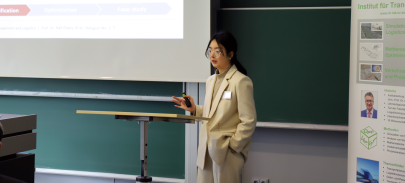
The transfer of our research results in the Combined Transport Innovation Lab at the House of Logistics and Mobility, Frankfurt am Main, thrives on exchange – including and sometimes especially with our students, who had the opportunity to get to know the showroom and HOLM together with Prof. Elbert on 1 February 2023.
The experts of tomorrow were able to experience the interactive showroom with its three systematically developed stations: the information wall supplemented the knowledge about CT already obtained in the courses; they were able to see our current research results on the monitors provided and – last but not least and always the center of great popularity: the interactive “game” table with typical examples of data-driven planning. There, the students tested their acquired understanding of the multi-link transport chain of CT in two brainteasers, once as a forwarder and once for an operator.
They were then welcomed by Prof. Gerd Riegelhuth, Katharina Nagel and Dominik Gurske in the ELISA showroom at the HOLM. Prof. Riegelhuth gave the students exciting insights into the tasks and organization of the Autobahn GmbH with regard to future-oriented solutions and approaches in the field of data transfer, automated driving and also autonomous driving, which was met with curiosity by the young people.
Mr. Gurske then presented to the students the research project “Electrified, Innovative Heavy Traffic on Motorways” (ELISA), which is being carried out together with the TU Darmstadt. The regional test route of this project was recently extended by a further 7 km and offers an insight into future-oriented and sustainable solutions. These could also be a resource-saving implementation for the pre- and post-carriage of CT. While road and rail freight transport are occasionally portrayed as direct competitors, today's figures suggest that neither will be able to handle the traffic volumes of the future on their own. In this respect, the outlook offered to the students on possible joint solutions and bridging technologies, such as trucks driving on overhead lines – perhaps also in platoons – was particularly impressive.
We would like to thank Katharina Nagel and Tobias Schenkel for the successful visit, and Yuerui Tang and Eva Hartmann for the organization. We are looking forward to the next time!

Today we would like to present the AiF IFL project “roboKOM”, which we successfully completed last year together with Prof. Elbert, Julia Wenzel as well as Giorgi Tadumadze and Dr. Weidinger from the Chair of Management Science/Operations Research. The project dealt with the application areas of mobile picking robots and was consequently dedicated to a current and relevant topic.
The use of mobile picking robots has increased in recent years, but for the most part, instead of possible potentials, the challenges and problems that arise from the acquisition of picking robots are mostly seen. Manual picking is often reverted to in order to remain efficient in day-to-day operations. Construction measures are mostly only taken into account when building a new warehouse in the form of automated high-bay warehouses, i.e. the highest automation level of warehouse systems.
The research project took up this point. In the recent past, some studies have already dealt with efficiency increases of mobile order picking robots, but the area of application was already assumed in these studies. Often, only the application area of e-commerce is considered. Now the question arose in which areas, preferably within SMEs, a meaningful application would be guaranteed. The aim of the research project was to identify possible areas of application and to provide interested practitioners with instructions on the cost-benefit ratio.
More information about this project can be found here .
You can find more information on the results in our report in German language.

Combined transport not only drives our research, but also our teaching! During our Logistics Live! excursion this winter semester, our students were given a tangible and practical insight into the design of combined transport (CT) transport chains. They learned first-hand about the potentials and benefits associated with the use of CT and the difficulties and problems CT actors face.
In order to get to know the interfaces of the two transport modes rail and road in more detail, 28 students together with the team of the Chair were allowed to visit first the Railport Darmstadt of DB Cargo AG and then the KTL Kombi-Terminal Ludwigshafen last Friday. We would like to express our sincere thanks to Jan Bellinger, who guided the students around the Railport site, vividly demonstrating the challenges that have been overcome in recent years and how new concepts for the Railport have been developed and implemented. The impressions gained at Railport were greatly complemented by a presentation at KTL by Harald Schlegel and a bus tour of the KTL site, during which the students learned more about the handling of intermodal transports in one of Europe's leading transshipment terminals. The students followed the path of a loading unit and experienced live which steps it goes through during cargo handling as well as upstream and downstream and which administrative measures are necessary in the background.
The team of the Chair and especially Prof. Elbert, Anne Friedrich and Felix Roeper are very grateful for and happy about the exciting insights and the hospitality of the practice partners, which made the successful organization of the excursion possible!

How could new business model innovations revolutionize the information exchange in transportation?
This question was central to our master seminar on lots of exciting topics connected to digital platforms in transportation. On 19 January 2023, to officially close the seminar, 28 students presented the results of their seminar work at our Innovation Lab on Combined Transport at the House of Logistics and Mobility in Frankfurt (Main).
During the seminar, our students researched the potential of digital transport platforms to fundamentally change the organization of transport chains and what potential these platforms offer to increase efficiency and productivity along the transport chains. They examined the business models of existing platforms in the market and developed classifications for them. In some cases, the students addressed the entire intermodal transport chain or examined different solutions from other fields of transport (such as last mile/city logistics platforms) and specialized platforms (such as web-based time window management systems). They also made country comparisons (between transportation platforms in Germany and the U.S.), identified trends in platform solutions in the mobility sector (such as increasing sharing concepts), and applied these to freight transportation.
The team around Prof. Elbert thanks all students for the exciting lectures and lively discussions, and Anne Friedrich and Felix Roeper for the supervision of the course and successful closing event!

“Logistics is about connecting the world,” Matthias Hanke from Roland Berger AG quite accurately stated during a very successful guest lecture on considerations from the perspective of Logistics service providers (LSPs) and carriers here at TU Darmstadt last Tuesday.
This statement is central to our series of guest lectures: We connect the theoretical aspects of our lectures with the practice of logistics businesses and the industry. Therefore, we extend a big thank you to Mr. Hanke for visiting our campus and our students as part of our lecture “Strategic Logistics Management” which deals with strategic logistics management and with the function, conception and trends of logistics and presents them in models of logistics management.
Alongside our students, we were excited to learn more about the challenges and opportunities for operators and LSPs from a different point of view, and to get insight not only into the impact of digitalization in the logistics industry but also into the status of freight platforms.
We are looking forward to the next time!

The digitization of transport chains continues to advance in the new year. Thus, increasing digitization may also open up opportunities to take further steps in the direction of synchromodal transport chains. The topic of synchromodal transport chains, which is also being promoted by the European Commission, is synchronized and interconnected transport networks that allow the means of transport to be changed in real time. This enables greater use of environmentally friendly means of transport, such as rail or inland waterways.
On this topic, Prof. Elbert and our research associate Johannes Rentschler had the great opportunity to speak at the Annual Meet of the Transportation Research Board in Washington DC, USA last week. Together they presented their research results on the potentials of synchromodal transport, collected together with Felix Weber, in the session “Current Research in Intermodal Freight Transport”.
As is the case here in Europe, the digitization of transport chains is also a central topic for the US. Especially in the context of the annual meeting of the AT045 Intermodal Freight Transport Committee of the TRB under the leadership of Jolene Hayes, where Ralf Elbert has been strengthening the international research network as an international member since 2022, digital transport platforms were one of many points. For the research at our department, this topic forms a research focus. We have collected many of our research results on the topic here for you.
We are happy about the successful attendance and look forward to the next time!
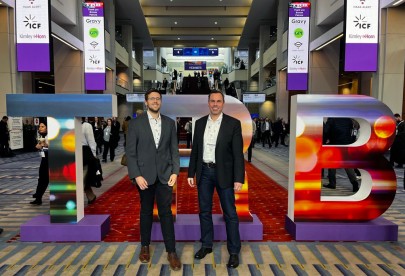
2022
A new research project has started: With “KIBA”, we are researching artificial intelligence and discrete loading optimization models for increasing capacity utilization in combined transport together with Prof. Elbert and project manager Yuerui Tang.
The continental combined transport is characterized by a great heterogeneity of the loading unit types and the rail wagons used. Therefore, a valid and optimized allocation between the loading units and the rail wagons according to various target variables is to be determined. In addition to the static-technical characteristics of the semi-trailers, containers and swap bodies (interchangeable containers) in their different designs and rail wagons, variable parameters also play an important role, such as the actual weight and type of load and the timetable.
The project goal: Within the shortest possible time, each request for loading of a loading unit receives a proposal for optimal placement of the loading unit on a deployed wagon set – and this already before
all information is available about which other loading units for the same origin/destination relation will still arrive at the dispatch terminal until departure. Loading optimization is supported by AI and is intended to further advance the capacity control of operators with their extensive networks.
With a planned duration until September 2025, this project is being funded by the German Federal Ministry of Digital Affairs and Transport with up to 2.34 million euros as part of the Innovation Campaign Artificial Intelligence in Mobility. Our Vice President for Research and Young Scientists Prof. Peter Stephan accepted the BMDV's funding certificate from State Secretary Hartmut Höppner at the official handover ceremony in Berlin on November 25, 2022.
Together with our project partners Kombiverkehr KG, Goethe University-Frankfurt, Deutsche Umschlaggesellschaft Schiene-Straße (DUSS) mbH, VTG Rail Europe GmbH, INFORM GmbH and KombiConsult GmbH, we are looking forward to an exciting project full of innovative and future-oriented results.
You can find more information about this project here.

How can research contribute to current challenges to business practice? The shift in transport routes or new demands on technology, for example, require new perspectives.
A productive exchange between practice and research on this topic took place last Tuesday with the works councils of DB Cargo AG in our Innovation Lab Combined Transport at the House of Logistics and Mobility in Frankfurt (Main).
The guests gained an in-depth insight into how application-oriented and practice-related our research is and what potential research cooperations offer: Of great interest was the presentation of an already completed and highly future-oriented project, which dealt with the problem of underutilized transport capacities. With the help of the project partner's evaluation of historical data, it was possible to create overbooking strategies and make reliable statements about possible capacity utilization increases.
With a very unique and, of course, practice-oriented view, the guests asked exciting questions about current challenges, such as new requirements for technology and their implementation – topics with which our current research is also concerned, as for example in the context of our research lab innovative freight car m².
Special thanks for the great planning and realization of the exchange go, among others, to Sascha Barthel and Frank Mattusch on the part of HOLM and Andreas Neuhoff from EVA Bildung & Beratung GmbH and, of course, to Prof. Ralf Elbert for the vivid and lively presentation and discussion.
We are grateful for the great exchange and are looking forward to the next visit!

A big thank you to Dr. Katja Hambsch, Benedikt Pöhner and Daniel Zwetzich from Horvath & Partners for their great guest lecture on 6 December 2022. As part of our lecture “Strategic Logistics Management”, we were very happy to welcome them at TU Darmstadt alongside students from no less than three different master’s programs from the department law and economics.
Our lecture deals with strategic logistics management and with the function, conception and trends of logistics and presents them in models of logistics management. In this context, the team around Dr. Hambsch shared exciting insights into their work and how they deal with Corporate Social Responsibility (CSR) and the Supply Chain Due Diligence Act (SCDDA). The 90-minute presentation was complemented with a highlight for our students: an interactive quiz for all participants.
We are looking forward to future guest lectures and further fascinating facts and insights!

As part of our course “International Logistics Systems”, we were pleased to welcome Dr. Sebastian Heger on 30 November 2022 for an exciting guest lecture on the topic of “Software-supported Workforce Planning in logistics”. As a senior consultant at M2P Consulting and OR specialist at WePlan Software, he was able to give our students valuable insights into the topic.
The guest lecture dealt with the specifics of medium- and long-term workforce planning for companies in the logistics and aviation industry. Using different case studies, it was clearly demonstrated how software-supported planning can help to master the challenges of recording the workload of volatile requirements, various shift modeling as well as location- and qualification-based actual and target planning, taking into account legal and internal corporate planning frameworks.
A big thank you for the exciting insights into this interesting topic!

How could new business model innovations revolutionize the information exchange in transportation?
This question is what drives our Bachelor and Master seminar on “Digital Transport Platforms” this winter semester. Digital transport platforms have the potential to fundamentally change the organization of transport chains and increase their efficiency. The seminar focuses on the analysis of platform-based solutions in intermodal and unimodal transportation. On November 1, 2022, Prof. Elbert, Anne Friedrich and Felix Roeper were happy to welcome our students to the official kick-off event. In the next months, 30 students will conduct systematic literature reviews, practice-oriented market analyses, and develop classifications to explore the business models of digital transport platforms. We are looking forward to a great semester!

We are pleased to announce the start of a new interdisciplinary research project at TU Darmstadt together with the Department of Management Science/Operations Research. The aim of the interdisciplinary project at TU Darmstadt is to evaluate the potential of spotters (small, powerful tractors) for different configurations and requirements at CT handling terminals. The project aims to develop an evidence-based, novel decision support system that helps to identify framework conditions under which spotters are advantageous. Similarly, the results will provide relevant recommendations for the future-oriented design of autonomously driving spotters. For more information, click here

Our research assistant Johannes Rentschler was recently in Kazakhstan and had the opportunity to visit Almaty as part of the cooperation with the German-Kazakh-University (DKU). As part of the research project “Analysis of transport and storage capacities along the Trans-Caspian Railway Route” he was able to conduct several on-site interviews with Kazakh and international logistics companies to take a look at challenges and potentials of the route.
In addition to the project work, the scientific and intercultural exchange was not neglected. In a guest lecture at DKU's LogistikClub, Mr. Rentschler also provided current insights into our research at the Chair.
A big thank you to Prof. Wolrad Rommel and Prof. Stefan Dilfer for the excellent organization – and the hospitality. We are looking forward to the next visit!

On September 15, 2022, we had the pleasure of welcoming State Secretary Ayse Asar from the Hessian Ministry of Science and Higher Education to our Innovation Lab on Combined Transport at the House of Logistics and Mobility (HOLM) in Frankfurt am Main.
On her tour of the multifaceted building, she visited our innovation lab accompanied by her ministry colleague Gerrit Stratmann and HOLM Managing Director Michael Kadow, and spoke together with Prof. Elbert and our team assistant Eva Hartmann about the opportunities and possibilities which combined transport offers for Germany and the modal shift. CT can make a major contribution to achieving climate goals and alleviating the burden on German roads. Very aptly, State Secretary Asar commented, “This is the future.”
A big thank you for the entertaining and exciting exchange. We are look forward to seeing you again!

We are pleased to announce that a new and highly topical research project has started at our research area: Together with Prof. Rommel from the German-Kazakh University (DKU) based in Almaty, Prof. Elbert and the project manager Johannes Rentschler are starting the “Analysis of transport and storage capacities along the Trans-Caspian Railway Route”.
The cooperation aims not only to promote German-Kazakh research exchange, but also to analyze potentials and challenges of the intensified use of the Trans-Caspian route between July and December 2022 and to find out to what extent the shift of freight shipments to the new routes requires additional time as well as investments in the expansion of transport and storage capacities.
A particular challenge, which has been shown in previous research activities, is the storage capacities along the route. Therefore, the project will analyze the storage capacities and derive recommendations for the strategic expansion of these capacities. To this end, expert interviews will be conducted with players in the logistics chain in Germany and Kazakhstan in order to uncover specific challenges. Based on the interviews and the shared data, the transport and storage capacities will be analyzed quantitatively.
The project is funded by the German Academic Exchange Service (DAAD) and the Federal Foreign Office Germany.
More information about this project can be found here .

As part of the WCTRS Virtual Meet 2022, Prof. Elbert and his team organized two sessions on “Climate Change – The role that freight transport can play to avoid emissions”.
The first session was organized in cooperation with the Transportation Research Board’s AT045 Intermodal Freight Transport Committee and highlighted different perspectives from Europe and North America. For both sessions we welcomed Prof. Thierry Vanelslander, who gave an interesting keynote on “How to decarbonize freight transport?”.
We then welcomed speakers from DB Cargo AG and TFG Transfracht GmbH, as well as from ICF and Pacific Merchant Shipping Association, who shared their professional perspectives on the topic. This was followed by a discussion identifying the most promising initiatives to reduce/avoid emissions in freight transport and an evaluation thereof.
The second session consolidated the results of the previous session and extended the view to Asia: after Prof. Vanelslander's keynote, we heard regional perspectives from Kazakhstan and China, and welcomed speakers from the Kazakh-German University as well as Flexport Asia and Maersk (China) Shipping Co, Ltd.. Additional initiatives were then identified and again evaluated.
For those who missed the successful and productive sessions, we have uploaded the video footage of Prof. Vanelslander's keynote as well as the presentations of the speakers from the industry and the results from both sessions here .
We are very happy about the frequent attendance at our sessions, about the active participation of the audience and the passion of the speakers. Thank you for making our Summer Sessions a success. See you next year at the WCTRS World Conference 2023 in Montréal!

It was finally that time again: as part of our Logistics Live! event, we started an excursion at our department again this year. About 20 students of the TU Darmstadt – mainly from our Master's seminar – joined us. Together with Hongjun Wu and Julia Wenzel from Prof. Elbert's team, they set off for Ludwigshafen for two plant tours in one day.
First, the tour went through the KTL Kombi-Terminal Ludwigshafen. The students learned more about the handling of intermodal transports in one of the largest container terminals in Europe.
After a short lunch break, the tour followed through the extensive BASF plant, where the students gained exciting insights into Bulk Logistics and also into the in-house development of Automated Guided Vehicles (AGV) to improve internal logistics.
A big thank you for the informative tours and exciting insights – we are looking forward to next time!

What exactly is combined transport? In the glossary of the House of Logistics and Mobility (HOLM), Prof. Elbert briefly explained this promising and future-oriented mode of transport, named its advantages and highlighted the different phases of the combined road/rail freight transport chain.
Combined Transport (CT) is not just a research topic for us: together with HOLM, we are organizing the “Forum Combined Transport” for the third time on September 23, 2022. For more information, please refer here.
CT also finds a stage in our “Innovation Lab on Combined Transport” , which we created together with HOLM: we have designed an interactive showroom with to promote diverse dialogue with different people from the transport and logistics industry, but also from politics and society.

Life is a constant exchange – and this was also the case for our students, who had the opportunity to get to know the House of Logistics and Mobility in Frankfurt am Main last Tuesday.
There, accompanied by Prof. Elbert, the experts of tomorrow first visited our interactive showroom, the “Innovation Lab on Combined Transport”, and learned more about application-oriented research and the complexity of the transport chain in combined transport.
They were then welcomed to the DB Cargo Lab by Holger Bartels, who enthusiastically told them about the Lab's Asset Intelligence Center (AIC), where digital and automated solutions are being developed to facilitate access to rail transport, increase capacity and optimize control. With the help of AI and the IOT, cross-platform challenges in rail transport are being worked on here to increase attractiveness and competitiveness. Particularly practical examples, such as condition-based maintenance of freight cars or automated damage detection, showed the students how study content can be implemented in practice.
We thank you very much for the exciting exchange and look forward to future visits!

We are pleased about another successful guest lecture!
With Dr. Felix Heusler from Isabellenhütte Heusler GmbH & Co. KG, we had the pleasure of welcoming an alumnus to our campus at TU Darmstadt on June 29, 2022.
As part of the course “Management of Value Networks”, Dr. Heusler spoke about supply chain disruptions and gave the students exciting insights into the current challenges of procurement and supply chain management. An important and topical issue – especially regarding current challenges in terms of raw materials and supply problems!
We would like to thank him very much on behalf of the team around Prof. Elbert and Raphael Hackober. We are looking forward to the next time!

Last week, the summer party of the Innovation Alliance between Deutsche Bahn AG and TU Darmstadt took place: on June 23, 2022, the alliance members met for a summerly get-together to exchange information about current projects and the activities of various working groups.
Within the Innovation Alliance, our department is represented by the “Research Lab Innovative Freight Car m²”, a cooperation institute between TU Darmstadt and DB Cargo. In the context of this, we would like to express our sincere thanks for and are pleased about the presence of Arne Redlin from DB Cargo and Raphael Hackober from the department at this year's summer party.
The aim of the cooperation institute is to promote joint research and cooperation in the field of planning and analysis of logistics and transport services and to create attractive offers in the areas of teaching, training and further education as well as university marketing. Joint research projects form the core of the Research Lab Innovative Freight Car m².

Another successful guest lecture in this semester:
As part of the lecture “Intermodal Transport Services”, we welcomed Axel Marschall, CSO and SMO in Logistics Mobility and Service Industry from Infront Consulting & Management GmbH to Technical Universität Darmstadt.
Mr. Marschall held a captivating lecture on Business Model Innovation in Logistics and Supply Chain Management and gave the students valuable insights on use cases of business transformation. A big Thank You from the team around Prof. Elbert and Hongjun Wu. We are looking forward to the next time!

Sharing experiences and knowledge is what drives progress, right?
Last Thursday, on 23 June 2022, our team around Prof. Elbert, Hongjun Wu and Julia Wenzel welcomed 17 students from our master’s seminar to our Innovation Lab on Combined Transport at the House of Logistics and Mobilty in Frankfurt (Main).
It was a fitting and successful end to the seminar: in groups, the students presented a poster of their own creation and led a discussion round. We are grateful to our students for the productive and active exchange on “The Future of Sustainable Transportation – How can intermodal freight transport contribute to reach the EU’s climate goals?” in the course of this seminar, as well as for the creative videos, presentations, posters and discussion polls they were able to create.
We are looking forward to next time!

Yesterday, we were very happy to welcome Klaus-Uwe Sondermann, Director of KombiConsult GmbH on campus for a guest lecture on Combined Transport, on the history and challenges, on what “players” are involved and what the competition looks like. We expect that all attending students are now experts on the topic!
A big thank you to Mr. Sondermann for his time and fascinating lecture! We are looking forward to the next time.

Combined transport is seen as having great potential for successfully managing current and future transport volumes and supporting the achievement of climate goals. Prof. Elbert and Michael Gleser, as part of the “KV-Radar” research project, have identified 27 initiatives which can shape the future of combined road/rail freight transport in a promising way and promote it. The magazine “Internationales Verkehrswesen” reports on the results of the research project in the current issue 2|2022. We are happy about the article and the great interest in this exciting research topic!
More about this promising project as well as the project results can be found here.

What can we do to decarbonize freight transport? How can freight transport avoid emissions?
To elaborate on this, we held a workshop we conducted a short and very productive workshop last week with numerous fellow researchers from the area of connecting logistics and freight transport operations to prepare for our research group SIG B3’ 2 planned sessions at the WCTRS Online Conference in 2022. A big thank you to all participants for their time and valuable input.
At the WCTRS Online Conference in July 2022, SIG B3 will be holding two sessions on “Climate Change – The role that freight transport can play to avoid emissions":
- Session 1 on July 26, 5 p.m. to 6.30 p.m. CEST
- Session 2 on July 27, 11 a.m. to 12.30 p.m. CEST
If you are interested, please contact Eva Hartmann (hartmann@log.tu-…).

Last Wednesday, on May 26, 2022, we were pleased to welcome Klaus Langendorf and Niklas Schink from DB Cargo AG to our campus. We are very pleased that Mr. Langendorf, as a member of the Supervisory Board of DB Cargo, gave our curious students an insight into the work of the Supervisory Board and vividly explained to them what tasks the Supervisory Board holds and handles on a daily basis. We would like to thank him for the exciting exchange and the informative lecture!
Afterwards, Prof. Elbert continued the lecture with the topic “Strategy and Strategy Management”.
A big thank you also goes to our students for their active participation. We are looking forward to next time!

The recently launched research project “Decentralized Planning of Platoons” is the subject of an exciting interview with Ralf Elbert and project manager Felix Roeper and was published in DVZ (Deutsche Verkehrs-Zeitung“. We are happy about the great article!
The article starts with the new research approach that the project is pursuing: a decentralized approach to planning and forming platoons. It is up to a learning artificial intelligence implemented in a respective vehicle whether or not to form or join a platoon.
Based on simulation, it will be investigated whether such a decentralized planning approach can be used to maximize cost savings as well as emission savings. In a first step, a transportation network will be modeled and supplemented with real traffic data to be implemented in a simulation model.
The project, which is funded by the state of Hesse and the House of Logistics and Mobility (HOLM) GmbH as part of the ”Innovations in Logistics and Mobility" measure of the Hessian Ministry of Economic Affairs, Energy, Transport and Housing, is being carried out jointly with project partners Visvanathan Ramesh uad Michael Rammensee from the Center of Cognition and Computation at the Johann Wolfgang Goethe University in Frankfurt am Main.
You can find more about this research project here .
We thank Carla Westerheide for the great interest in the research project and the realization of the article.

Last Saturday, the Chair celebrated its 10+1 year anniversary. Of course, the alumni were not to be missed, but the current team was also happy about the exchange. The developments of the last years were presented in an entertaining way, shortly followed by a guided tour through the offices – after all, the workspace has changed as well.
The team around Ralf Elbert would like to thank all participants for the great organization and the successful event. We look forward to many more successful years at Darmstadt University of Technology – and to the next joint celebration.
Last Wednesday, an excursion to the MegaHub Lehrte took place as part of our research project “KV-Hub”. On behalf of the TU Darmstadt, project manager Hongjun Wu and the research assistants Johannes Rentschler and Michael Gleser took part in the tour of the impressive transhipment facility for combined transport.
A warm welcome to the participants from the project sponsor BMVI as well as DB Cargo AG, EBA, KombiConsult and Kombiverkehr was followed by a tour of the terminal with its six transshipment tracks and an exciting discussion about current concepts as well as challenges and possible solutions. Afterwards, the focus shifted to the current status of the research project. The aim of the project is to shift road freight traffic to the more environmentally friendly combined transport (CT), which thus contributes to achieving the climate targets. Due to the limited economic competitiveness of combined transport compared to through road freight transport, in the past there has been an increasing concentration of combined transport services on only a few direct train-capable routes between major economic centers.
Here, you can find out more.
At the end of the successful event, the participants visited the train handling: a special impression that will remain. A big thank you to the organization and the participants for this exciting event – we look forward to the next visit!
PROJEKT KV-HUB – TEILNEHMER
Firma/Organisation* Teilnehmer*
- BMDV Jörg Stephan
- DB Cargo Marcel de la Haye
- Deutsches Zentrum für Schienenverkehrsforschung (EBA)
- Danny de Schultz
- Meike Holtkämper
- Frank Nolte
- KombiConsult Kai Petri
- Kombiverkehr
- Ulrich Bedacht
- Christoph Büchner
- Andreas Kraus
- Armin Riedl
- MegaHub Lehrte
- Daniel Bethge
- Jan Woydich

We are very happy about the recent nomination of Prof. Elbert as an International Member for the Standing Committee on Intermodal Freight Transport (AT045) of the Transportation Research Board (TRB). Congratulations!
The TRB is part of the National Academies of Sciences which provides independent, objective analysis and advice to the nation and conducts other activities to solve complex problems and inform public policy decisions.
We are looking forward to see how this strong collaboration will advance our research on application-based planning, control and analysis of logistics and transportation services at the department.

We are happy to announce that an exciting interview with Prof. Elbert and Felix Roeper about the research project “Exchange platform for delivery time windows – Increase of flexibility in the tour planning with delivery time windows in road freight transport” has been published in the second issue of the “BVL Magazin”.
The article starts with an apt summary of the current situation: many small and medium-sized freight forwarders can often only book unfavorable time slots on time window management systems (TWMS). An exchange mechanism for time slots is intended to help change this. The research project, initiated by the German Logistics Association and funded by the German Federal Ministry of Economics and Climate Protection as well as the German Federation of Industrial Research Associations (AiF e.V.), takes a new approach and is geared to the scheduling needs of small and medium-sized freight forwarders. The project aims to develop a cross-company digital platform on which unfavorable time slots of freight forwarders can be exchanged centrally. Project manager Felix Roeper is confident, saying, “The exchange mechanism should pave the way for the shortest or most cost-effective tours possible.”
More information on the research project can be found here.

Full steam ahead into the future: the research lab “innovative freight car m²” provides new impetus for innovative rail freight transport.
The new cooperative institute, founded by Technical University Darmstadt and DB Cargo, intensifies the long-standing collaboration and promotes joint research in the field of planning and analysis of logistics and transport services. Under the leadership of Prof. Elbert, data-driven solution methods will be found for strategic and tactical planning and control problems in rail-based, intermodal transport networks.
We are looking forward to the research projects on “multifunctional and modular freight wagons” (m²) that will be launched. The project results, which will benefit science and industry alike, are intended to help optimize rail freight transport and increase its attractiveness.
Through the research lab “innovative freight car m²”, additional positions for research assistants for application-oriented and practice-relevant research topics are created at the Department of Management and Logistics. You can find more information about the research lab “innovative freight car m²” here .

How can more goods be shifted from road to rail and what potential does Combined Road/Rail Freight Transport have in the Hanau/Gelnhausen-Schlüchtern region?
Last Monday, we discussed these and many other questions with the Mobility and Infrastructure Committee of the Hanau-Gelnhausen-Schlüchtern Chamber of Commerce and Industry (IHK) in our Innovation Lab on Combined Transport at the House of Logistics and Mobility (HOLM) in Frankfurt am Main. This made it possible to look at potential progress and innovation in relation to CT from a research perspective with a practical view.
Along with the exchange, there was a lively and animated discussion about the challenges of combined transport in the Hanau/Gelnhausen-Schlüchtern region, but it did not stop at identifying the problems, but also produced exciting approaches to solving them.
We thank you for the great planning and implementation of this exchange and look forward to seeing you again!
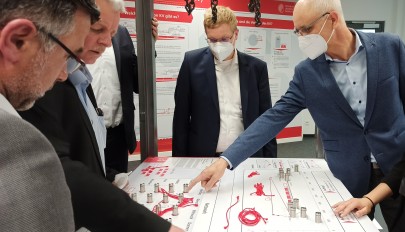
The BVL Schulterblick 2021 presented the winner of the German Logistics Award 2021: the project “Bayernshuttle” by DB Cargo AG and Logistik Service GmbH (LogServ) – Congratulations!
We are pleased that Prof. Elbert was able to contribute to the success of the event with his presentation on the challenges and opportunities of rail freight as a beacon of hope for sustainable transport. He also addressed development potentials for combined road/rail freight transport and presented the results of the CT-Radar .

Der Fortschritt lebt vom Austausch des Wissens. Und wer nicht neugierig ist, erfährt nichts.
Deshalb freuen wir uns sehr, dass wir am 23. März 2022 in unserem Innovationslabor Kombinierter Verkehr im House of Logistics and Mobility (HOLM) GmbH duale Studierende der DB Cargo AG zu einem sehr aufgeweckten und interessanten Austausch begrüßen durften.
Im Innovationslabor erfuhr – neben der Informationswand und den drei Terminals zu den jeweiligen KV-Akteuren, in denen aktuelle Forschungsergebnisse des Fachgebiets zum Thema „KV“ veranschaulicht werden – besonders unser Interaktionstisch mit zwei Knobelspielen besonders reges Interesse. Unter Anleitung von Felix Roeper konnten die neugierigen Studierenden ihren Wissensschatz einbringen, um die Spiele in Gemeinschaftsarbeit zu lösen.
Gemeinsam mit Prof. Elbert erörterten die Studierenden im Anschluss aktuelle Handlungspunkte zum Thema Kombinierter Verkehr und bekamen einen Einblick in die Forschungsarbeit unseres Fachgebiets.
Wir bedanken uns herzlich bei allen Beteiligten für die großartige Planung und für den gelungenen Austausch. Wir freuen uns schon jetzt auf das nächste Mal!
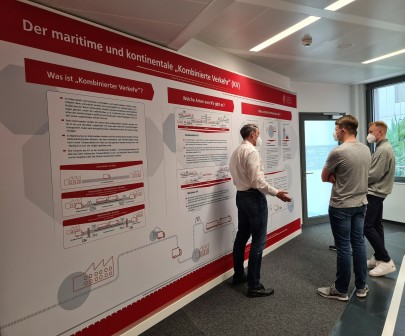
Celebrating the end of the practical course “Management of a Supply Chain”! Due to Corona, we were unable to hold this course face to face as we used to – and it was quite the challenge for us. However, we successfully completed this first digital attempt this semester with a new online simulation system! The LOG Team and Prof. Ralf Elbert thank all participants for joining this course, for their great presentations and the lively discussions. We hope you enjoyed this course as much as we did.

Vom 09. – 13. Januar 2022 feierte das Transportation Research Board Annual Meeting in Washington D. C. seinen 101. Geburtstag. Das Fachgebiet Unternehmensführung und Logistik war mit einem Vortrag auf der Konferenz vertreten. Johannes Rentschler präsentierte seine Forschung „Combined Hub Location and Service Network Design Problem – A Case Study for an Intermodal Rail Operator and Structural Analysis”.

On Wednesday, 19 January 2021, we concluded our seminar “Climate change, digitization and new opportunities – a boost for combined transport?” for this semester with a final presentation. In the seminar, our students were able to discuss current research topics in the field of combined transport and gain valuable insights into scientific writing. The LOG Team and Prof. Ralf Elbert thank all participants for their interesting presentations and the lively and engaging discussions.

“How to shape an excellent supply chain” was the topic of our yesterday's guest lecture with Bosch Rexroth. The entire team and Pro. Ralf Elbert thank Helmut Krauss and Matthias Pfister for their entertaining and fascinating presentation. They shared with us the vision of “Logistics Excellence” and the challenges of establishing an excellent supply chain. We received fantastic feedback after the talk, and we are looking forward to hopefully welcoming Mr. Kraus and Mr. Pfister again soon.

2021
As part of the Winter Simulation Conference 2021, Prof. Ralf Elbert and Michael Gleser presented a commercial case study entitled “Assessing the hinterland of maritime ports in the european northern range”. The project, which was developed in cooperation with the Port of Rotterdam, deals with North Rhine-Westphalia as the hinterland of the ports in the northern range and examines the competitive situation. Many thanks to Frank van der Laan from the Port of Rotterdam for the great cooperation.
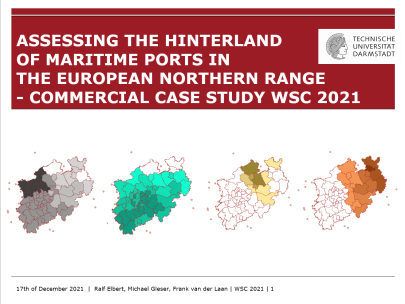
Our top priority is to make our lectures as practical and interesting as possible. That's why we were particularly pleased to welcome Dr. Holger Schmidt from DB Cargo AG to our “International Logistics Systems” lecture today. In his lecture, Dr. Schmidt took us on a journey through the development and use of the “m² – the module-based platform for multifunctional wagons”. On behalf of the Department of Management and Logistics – Technical University of Darmstadt and Prof. Ralf Elbert, a big thank you!
The Berlin transport administration is asking itself this question and would like to investigate this on the basis of a feasibility study. The Berliner Tagesspiegel reported on this on 01.11.2021. In the article you will find an expert interview with our research assistant Johannes Rentschler, who is investigating this topic in his research.
Enjoy reading!
Yesterday, the 2nd Combined Transport Forum and the opening of our Combined Transport Innovation Lab took place at the House of Logistics and Mobility (HOLM). A great day filled with exciting presentations, among others by Dr. Sigrid Evelyn Nikutta, as well as a panel discussion and finally a personal exchange on site again!
Many thanks to all participants and to the HOLM for the great organization!
For more information on our CT activities at the HOLM, click here: Combined Transport at Holm








